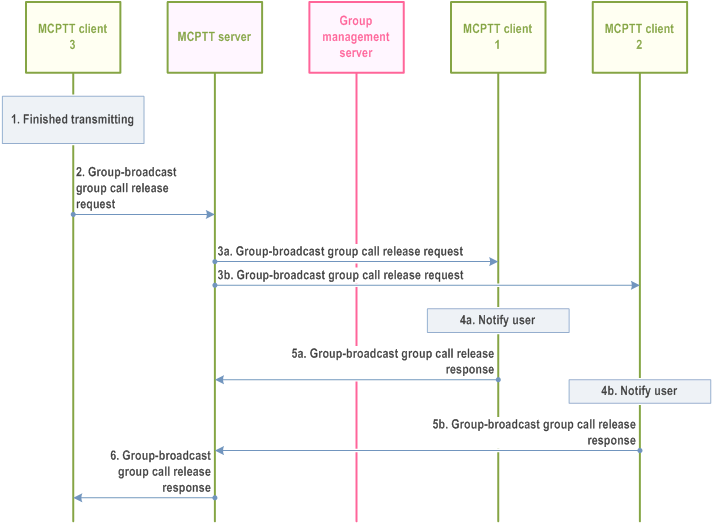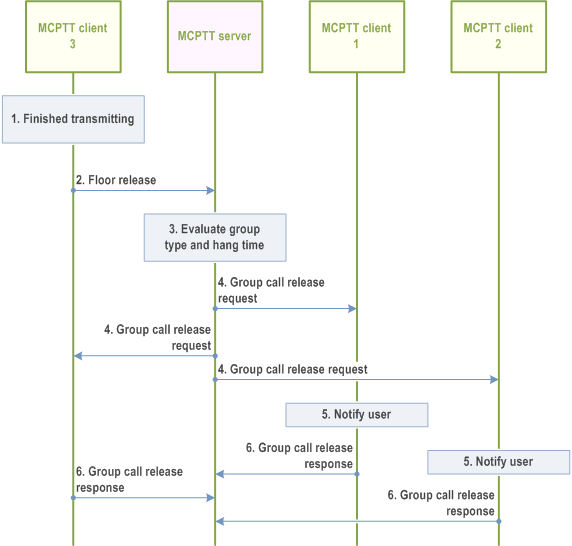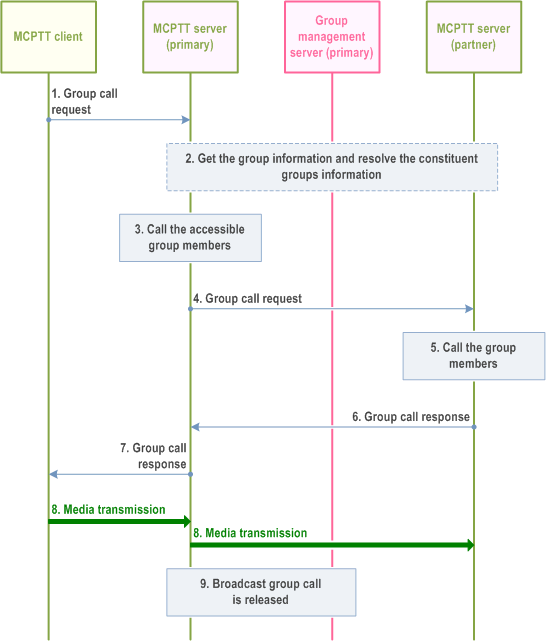Content for TS 23.379 Word version: 19.3.0
1…
7…
7.4…
10…
10.5…
10.6…
10.6.2.2.13…
10.6.2.2.24…
10.6.2.3…
10.6.2.3.1.2…
10.6.2.3.2…
10.6.2.4…
10.6.2.4.3…
10.6.2.5…
10.6.2.5.2.3…
10.6.2.6…
10.6.2.6.2…
10.6.2.7…
10.6.2.10…
10.6.3…
10.7…
10.7.2.2…
10.7.2.3…
10.7.3…
10.7.4…
10.7.5…
10.7.5.2.3a…
10.7.6…
10.7.6.2.3…
10.9…
10.9.1.3…
10.9.1.3.2…
10.9.1.3.3…
10.9.1.4…
10.9.1.5…
10.9.2…
10.9.2.6…
10.10…
10.12…
10.14…
10.15…
10.19…
10.19.2.11…
10.19.3…
10.19.3.1.4…
10.19.3.2…
10.19.3.2.4…
10.19.3.2.6…
A…
A.4…
B…
10.6.2.5.2.3 Group-broadcast group call release procedure
10.6.2.5.2.4 Server-initiated broadcast group call release procedure
10.6.2.5.4 Group call for broadcast temporary groups across multiple MCPTT systems
...
...
10.6.2.5.2.3 Group-broadcast group call release procedure p. 78
When the call originator has completed transmitting, the group-broadcast group call is terminated and resources released.
Figure 10.6.2.5.2.3-1 illustrates the procedure for group-broadcast group call release.
Pre-conditions:
- An on-going group-broadcast group call involving MCPTT client 1, MCPTT client 2, and MCPTT client 3 exists.

Step 1.
MCPTT user on MCPTT client 3 finished transmitting.
Step 2.
A group-broadcast group call release request is sent to the MCPTT server of the group-broadcast group.
Step 3.
The MCPTT users of MCPTT client 1 and MCPTT client 2 of the group-broadcast group's subordinate groups are sent a group-broadcast group call release request
Step 4.
MCPTT client 1 and MCPTT client 2 notify their users that the group-broadcast group call has ended.
Step 5.
MCPTT client 1 and MCPTT client 2 respond to confirm the release of the group-broadcast group call by sending a group-broadcast group call release response.
Step 6.
The MCPTT server sends a group-broadcast group call release response indicating to the initiator that the call is now terminated.
10.6.2.5.2.4 Server-initiated broadcast group call release procedure p. 79
In a broadcast group call, when the call originator has completed transmitting, the MCPTT client releases the floor. Upon receiving the floor release message the MCPTT server then determines if the broadcast call should be released.
Figure 10.6.2.5.2.4-1 illustrates the procedure for server-initiated broadcast group call release.
Pre-conditions:
- An on-going broadcast group call involving MCPTT client 1, MCPTT client 2, and MCPTT client 3 exists.
- MCPTT client 3 is transmitting.

Step 1.
MCPTT user on MCPTT client 3 finished transmitting.
Step 2.
MCPTT client 3 sends a Floor release message to the MCPTT server of the group.
Step 3.
The MCPTT Server determines that the group is a broadcast group and decides that the call should be released.
Step 4.
The MCPTT server sends a Group call release request to MCPTT clients 1, 2, and 3.
Step 5.
MCPTT client 1 and MCPTT client 2 notify their users that the group call has ended.
Step 6.
MCPTT clients 1, 2, and 3 respond to confirm the release of the group call by sending a group call release response.
10.6.2.5.3 Void
10.6.2.5.4 Group call for broadcast temporary groups across multiple MCPTT systems |R16| p. 80
Figure 10.6.2.5.4-1 illustrates the procedure for broadcast temporary group calls across multiple MCPTT systems.
Pre-conditions:
- The security aspects of sharing the user information between primary and partner MCPTT systems shall be governed as per the service provider agreement between them. In this case, we consider the partner MCPTT system does not share their users' information to the primary MCPTT system.
- A broadcast temporary group is formed on the MCPTT server of the primary MCPTT system by an authorized MCPTT user (e.g. dispatcher) by the group regroup procedure (subclause 10.2.4.2 in TS 23.280) and identified via a temporary MCPTT group ID.
- The affiliated MCPTT group members of the constituent MCPTT groups have been implicitly affiliated to the temporary group.
- The MCPTT user of the MCPTT client is authorized to transmit on a broadcast temporary group.
- One or more of the constituent groups of the temporary group may belong to MCPTT servers of partner MCPTT systems.

Step 1.
The MCPTT user via MCPTT client initiates a group call for a broadcast temporary group with an MCPTT group ID, temporary group indicator, and the broadcast indicator. A group call request message with the MCPTT group ID is routed to the MCPTT server of the primary MCPTT system, which owns the group and is where the authorized MCPTT user/dispatcher created the broadcast temporary group. The MCPTT group ID is a temporary MCPTT group ID.
Step 2.
The MCPTT server of the primary MCPTT system obtains the temporary group information (either from group management server or itself) including the constituent MCPTT groups' identities, accessible group members list of the constituent groups, the broadcast group type, and other related data.
Step 3.
The MCPTT server of the primary MCPTT system initiates directly a call request to the accessible group members using the detailed user information and/or location information. The group members upon receipt of the call request may accept or reject the call.
Step 4.
The MCPTT server of the primary MCPTT system may not have access to group members' information of the constituent group belonging to the partner MCPTT system. For such group members, the MCPTT server of the primary MCPTT system initiates a group call request message to the MCPTT server of the partner MCPTT system with the target group's MCPTT group ID information.
Step 5.
The MCPTT server of the partner MCPTT system further initiates a call request to the clients of the constituent group's members as described in step 3.
Step 6.
The MCPTT server of the partner MCPTT system provides a group call response to the MCPTT server of the primary MCPTT system with success or failure result and/or detailed reason information if there is a failure.
Step 7.
The MCPTT server of the primary MCPTT system provides a group call response message to the MCPTT client of the affiliated MCPTT user upon receiving responses to the call requests sent to members of primary and partner MCPTT systems. The group call response message will consist of the success or failure result and/or detailed reason information if there is a failure.
Step 8.
Upon successful call setup completion a broadcast group call is established for the group members from constituent groups of multiple MCPTT servers. The call originating MCPTT user starts transmitting media to other group call participants. The media is also distributed to the partner MCPTT system.
Step 9.
At the completion of the media transmission, the broadcast temporary group call is released.